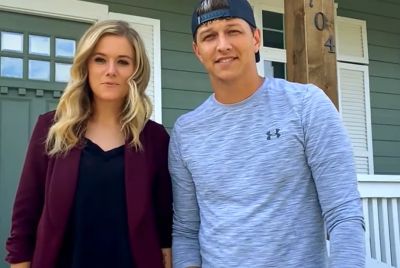Campbell Soup Company VP's 3D-Printed Meat Scandal Threatens Hundreds of Employees in Florida
Florida's attorney general said that they strictly ban lab-grown meat

Campbell Soup Company is facing a growing crisis after its Vice President and Chief Information Security Officer, Martin Bally, was secretly recorded making severe claims about Campbell's products during a private meeting in January.
The remarks, captured in Florida, raised concerns about the alleged use of bioengineered meat and so-called 'chicken from a 3-D printer'. The recording triggered a state investigation that began soon after, as officials warned that Florida law bans lab-grown meat.
The case now threatens hundreds of Campbell workers in the state. Investigators are reviewing how the remarks surfaced and how the issue spread across Campbell's operations.
READ MORE: Coca-Cola To Bring Back Diet Cherry Coke In 2026 To Jumpstart Sales Next Year
READ MORE: Outrage as Pizza Chain Forces Customer to Choose 15, 20 or 35 Percent Tip With No Way to Enter Zero
Hundreds of Campbell Workers Could Lose Their Jobs
The warning from Florida officials has placed many Campbell employees on edge. State Attorney General James Uthmeier said the state would 'shut down' any company found in violation of the law banning lab-grown meat.
Florida law bans lab-grown meat.
— Attorney General James Uthmeier (@AGJamesUthmeier) November 24, 2025
Our Consumer Protection division is launching an investigation and will demand answers from Campbell’s. https://t.co/9nDO0EbDwH
He directly referenced Campbell's when announcing the investigation. His office said the Consumer Protection division would demand full explanations from the company, adding that the recording raised immediate compliance questions.
Reports indicated that hundreds of Campbell workers in Florida could lose their jobs if the investigation results in a shutdown. Local authorities said the possibility of a closure created strong fears among employees about sudden job losses.
Uthmeier repeated that 'Florida law bans lab-grown meat' and said the state must act when public confidence is shaken by such claims.
Campbell Faces Intensified Scrutiny in Florida
The remarks from Uthmeier quickly increased scrutiny on Campbell's supply chain and production standards. Florida is among seven states with active bans on the sale and production of lab-grown meat. The state's law took effect last year, giving regulators broad powers to investigate any suspected non-compliance.
The situation placed Campbell's under greater pressure to prove that its products meet all ingredient safety standards. State officials said the recording raised questions that must be answered through a thorough review.
Companies operating in Florida now face stronger monitoring, and Campbell's response will determine the next steps in the investigation.
Campbell VP's Bioengineered Meat Claims
The recording came from former employee Robert Garza, who said he captured more than an hour of Bally's comments. Garza said the meeting was meant to discuss his salary. Instead, he heard Bally claim that Campbell's makes 'highly processed food' and that the products were for 'poor people'.
Bally said he did not buy Campbell's products because he believed they were unhealthy. He added that 'Bioengineered meat — I don't wanna eat a piece of chicken that came from a 3-D printer'.
Garza said he felt 'pure disgust' and later reported the behaviour. He was dismissed 20 days after raising the issue. The recording also included racist remarks about Indian colleagues, along with statements about using marijuana edibles before work.
Campbell spokesperson James Regan said the comments were 'unacceptable' if proven accurate. He said they were 'patently absurd' and stressed that Campbell VP Bally works in IT and has no role in food production.
Regan said the company uses trusted, USDA-approved suppliers and added that its chicken products follow strict standards.
Where Is Campbell's Vice President Now?
Bally is now on leave while Campbell's conducts its internal investigation. He is also a named defendant in a lawsuit filed in Wayne County Circuit Court by Garza.
The case accuses Bally and the company of racism, drug use at work, a hostile environment and retaliatory firing. Garza's attorney, Zachary Runyan, said the dismissal came 'out of nowhere'.
The lawsuit seeks compensation for emotional distress, economic harm and legal fees.
© Copyright IBTimes 2025. All rights reserved.




















